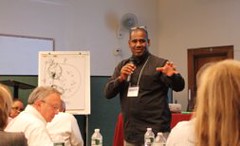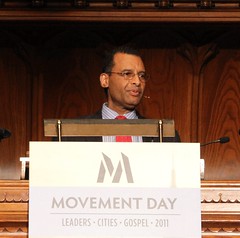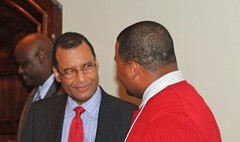by Christine A. Scheller | Dec 1, 2011 | Feature, Headline News |
 Could child sponsorship help quell the tide of the AIDS pandemic? Rev. Jarvis Ward, National Facilitator of City and Missionary Communities for Mission America, thinks it can. Back in September I heard Ward speak at an HIV/AIDS workshop in New York City. He said child sponsorship is a manageable way for “people in the pew” to make a long term difference in the lives of those impacted by HIV/AIDS.
Could child sponsorship help quell the tide of the AIDS pandemic? Rev. Jarvis Ward, National Facilitator of City and Missionary Communities for Mission America, thinks it can. Back in September I heard Ward speak at an HIV/AIDS workshop in New York City. He said child sponsorship is a manageable way for “people in the pew” to make a long term difference in the lives of those impacted by HIV/AIDS.
I attend a lot of academic seminars and was initially disappointed that the Movement Day workshop was more about child sponsorship through the relief organization World Vision than it was a seminar on HIV/AIDS. But then, I realized the goal wasn’t to fill attendee’s heads with facts; it was to actually make a difference in the lives of suffering people.

Rev. Jarvis Ward speaking at Movement Day in New York City
Ward was at Movement Day inviting church leaders to participate in the National Day of CARE: Hope Sunday Campaigns, an event he said is modeled on the National Day of Prayer, but with the goal of getting at least 50 congregations to sponsor 1000 or more orphans in Uganda, the nation where HIV/AIDS first emerged as a public health problem. It’s “soft launch” is scheduled for December 4, 2011 to coordinate with World AIDS Day, which is today.
When I interviewed Ward after he spoke, he explained his commitment to World Vision, in part, by saying, “If we eliminated AIDS with a vaccine today and all the people who were destined to die in the next couple of days would not, one thing would remain: they would still be poor, and without [adequate] housing or health care.”
“The desires of the heart are hunger pains that drive our action,” Dr. Scott Todd, an immunologist and former director of Compassion International’s AIDS Initiative, writes in his new book, Fast Living: How the Church Will End Extreme Poverty. And, “Jesus didn’t come to make sure we wouldn’t be hungry—He came to make sure we were hungry for the right things.”
Todd developed an insatiable hunger to act on extreme poverty after an encounter with a 12 year old Tanzinian girl who died unnecessarily of AIDS. The girl’s name was Jacqueline and both her parents had died of AIDS before her.

“The day I visited Jacqueline, she was lying on a mat outside her grandmother’s mud hut. Her HIV infection had spread with unexpected speed, dismantling her immune system and leaving her defenseless to a host of other infections,” Todd writes. “I knelt in the crusted dirt at Jacqueline’s side and prayed for her. I prayed with optimism because just the day before a local Christian hospital agreed to provide those lifesaving medicines for fifty-three children.”
The following day Todd left Africa. When he arrived home, he received the message that Jacqueline had died and vowed to do everything in his power to never be too late again.
“I’m not the only one who bears the burden of Jacqueline’s death,” he says. “The loss is not ‘theirs’ or ‘mine.’ It is our loss. We all bear this burden.”
Todd now serves as senior ministry advisor in the president’s office at Compassion. He says that extreme poverty has been cut in half in one generation and we have the capacity to finish the job in ours. In 1981, for example, 52 percent of the world’s population lived on less than $1 per day, but by 2005, that number had been reduced to 26 percent.
“If there is anything that exposes the lies of poverty it is the gospel,” he says. “But the gospel proclaimed is not enough. Disenfranchised people need the whole gospel–in action as well as words. They need Jesus’ spoken truth and they need his disciples to live it. They need to see the muscles of the gospel flex, expressing love in gritty, persevering, intelligent, effective action.”
The church is better equipped to deal with extreme poverty than governments or businesses, though both have important roles to play, he says in Fast Living, but too many Christians have been paralyzed into inaction by the mistaken believe that Jesus was speaking prophetically when he told the disciples the poor would always be with them.

Dr. Scott Todd
“A lie was born,” Todd writes. “A fatalistic belief that has fed lethargy while many millions of children starved. We took Jesus’ words to Judas and used them to enshrine our anemic expectations for the world’s poorest people.”
He argues instead that Jesus was simply defending Mary (who had poured expensive perfume on Jesus’ feet), confronting Judas’ greed, and making the point that the disciples would always have opportunities to help the poor, but their time with him was short.
He says many of us also wrongly believe that when Jesus and other biblical writers talk about “the poor,” they are speaking metaphorically about every kind of human brokenness. He says this misreading has dire consequences.
“If we are all poor, then the condition of poverty is unsolvable until Jesus returns, and anti-poverty organizations can expect to be in business for a long, long time.”
Therefore, he uses the words poverty and poor to refer only to those who live on less than $1.25 per day. “Our goal, based on that definition, is to expect the end of extreme poverty,” he says. This will happen when we “create a new culture of effective Christian generosity” by making poverty personal and taking “credible action” on behalf of the poor. And, on behalf of those who have been impoverished by HIV/AIDS.
by Christine A. Scheller | Oct 7, 2011 | Feature |

Dr. A.R. Bernard speaking at Movement Day in New York City.
Dr. A.R. Bernard is pastor and CEO of the 35,000-member Christian Cultural Center (CCC) in Brooklyn, New York, but spent ten years as a banker before he and his wife, Karen, founded the church 33 years ago.
Bernard was a keynote speaker at Movement Day, a New York City conference designed to accelerate gospel movements in America’s cities. While Dr. Tim Keller, pastor New York’s Redeemer Presbyterian Church, talked about the injustice of ignoring the needs of the poor, and Erwin McManus, pastor of Mosaic in Los Angeles, talked about the “spaces between us,” Bernard focused on how to build an institution and about “sanctifying” the customer service policies of American Express and Disney World.
An expert in organizational operations and best practices, Bernard told the audience, “Whereas others got into church planting and some started para-church organizations, we decided that we would establish an institution.”
People sometimes have negative perceptions of institutions, but “when creativity, innovation, and faith keep that organization alive and on the cutting edge, an institution becomes an entity that preserves not just history, but a record of progression,” he said.
Because Bernard believes managing both continuity and change are vital to longevity, he and his team at CCC came up with four “timeless fundamentals” that are implemented throughout the church’s departments:
1. clearly articulated, defined core values
2. clearly articulated, defined core purposes
3. remaining relevant and on the cutting edge of what CCC does
4. strength beyond the presence of any one individual.
“I’ve seen organizations that were built on a person,” Bernard explained. “That’s great because a charismatic leader does become the creative visionary force behind the establishment and building of an organization, but what happens is when it’s solely built on that person, when that person dies, the organization dies.”
“What one person begins, it takes a team of people to continue,” he added.

Dr. A.R. Bernard talking to an attendee at Movement Day.
This is where American Express and Disney World customer service training come in.
Bernard met with the American Express chief executive officer over marketing and customer service development in 1990 to glean principles that he could “sanctify” for ministry. The executive was so taken aback that a church was interested in customer service that she gave Bernard a copy of the company’s training manual, with the caveat that Bernard wouldn’t pass it to AmEx competitors.
“This was an awakening for many people. It really helped them to understand the difference between task and purpose because too many of them, without the proper training, become task oriented,” Bernard said.
For example, an usher whose task is to seat a person would defeat his or her purpose by treating parishioners rudely. “They’ve achieved their task, but failed in achieving their purpose, if the purpose is to make people feel warm and welcome,” he explained.
After a decade of using the AmEx model, Bernard looked to Disney for guidance, even taking 1,000 staff members to the entertainment giant’s training center in Florida for a staff retreat.
“Compliance and commitment are two different things,” he said. “People can comply just to be a part of the staff, just to be in the community. They’re not necessarily committed to the vision.”
That’s why CCC invests in both staff and volunteer development.
When UrbanFaith talked to Bernard during a break, he said he met with resistance when he first adopted customer service principles at CCC.
“There are those who are in a particular mind frame with regard to what the parameters of doing church and doing ministry is, and they were very critical,” he said. “Interestingly enough, here it is 20 years later and they’re now asking: how do we do it?”
“Ministry means serving,” he explained. “It means serving people and you need to be creative, you need to be wise, working within the principles of the faith, the orthodoxy of the faith, to achieve them. It requires structure. It requires organizational thinking and that’s my background.”
He looked to Moses as a biblical model for institutional leadership, he said.
“When I saw how God allowed Moses to grow and develop and learn and be educated in these things in Egypt, because he would then have to use it to lead and organize and structure over a million people that would become the nation of Israel, I appreciated that experience. I appreciated Moses in a different way.”
Bernard also talked about creating a home away from home for parishioners so that the emotional experience they have at church is a positive one.
“When people come to your church or whatever it is, your establishment that you are building for God, they leave with an emotional experience. If you don’t intentionally determine what that experience is going to be, then chances are great that it’s going to be negative and that will be the last time they come there. Environment is more than just a place that you gather to; it’s what you experience when you’re in that place,” he told the Movement Day audience.
So why not make the place they go to experience God their home away from home? Bernard asked. For Christian Cultural Center members, that home away from home grew from a storefront church into an 11.5 acre campus that is a catalyst for redemptive change in its community. And one man’s bold vision for “sanctifying” the skills he learned as a banker helped get it there.
 Could child sponsorship help quell the tide of the AIDS pandemic? Rev. Jarvis Ward, National Facilitator of City and Missionary Communities for Mission America, thinks it can. Back in September I heard Ward speak at an HIV/AIDS workshop in New York City. He said child sponsorship is a manageable way for “people in the pew” to make a long term difference in the lives of those impacted by HIV/AIDS.
Could child sponsorship help quell the tide of the AIDS pandemic? Rev. Jarvis Ward, National Facilitator of City and Missionary Communities for Mission America, thinks it can. Back in September I heard Ward speak at an HIV/AIDS workshop in New York City. He said child sponsorship is a manageable way for “people in the pew” to make a long term difference in the lives of those impacted by HIV/AIDS.




